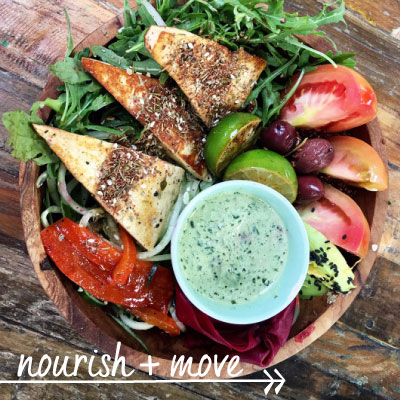You Need This: The Definitive 3-Day Gut Reset Diet
By Dr Amy Shah MD
2 January 2017
In my practice, I try to blend the best of ancient medicine practices with modern medical wisdom. This three-day gut cleanse utilizes modern science and Ayurveda. In both Ayurveda and modern medicine, we're learning just how much gut health is the crux of our general physical and mental health. This quick, easy cleanse will make you feel better in your belly, body, and brain.
1. Before you begin, do an intermittent fast.
Just like you, your gut needs a period of rest and rejuvenation to function optimally. Giving your gut a break can reduce inflammation, shed water weight, and reduce bloating. Studies are coming out all the time supporting the benefits of intermittent fasting, which gives the body a break for a set number of hours so that your gut can repair, reset, and rest. The night before you start your cleanse, I want you to plan to fast for 12 to 16 hours. This is easier than it sounds—a 12-hour fast simply means ending your consumption at 7 in the evening and not eating breakfast the next day until 7 a.m.
2. Start your morning with water.
Drinking water, especially warm water on an empty stomach, is one of the best things you can do for digestion. Warm water takes less energy to digest and stimulates digestion while detoxing the system and aiding digested food through the digestive tract. Start your day with at least one full class of room-temperature water before you consume any food.
3. Have a sugar-free breakfast.
Fruit sugars are OK (berries are best), but make sure they're accompanied by plenty of fiber and fat, so you don't have a blood sugar crash. Try this green smoothie recipe or this sweet potato hash. Buckwheat overnight oats are a great choice, as is a quinoa breakfast bowl.
4. Midmorning, have a cup of chai.
Boil 1 cup of water, then add in 1 heaping tablespoon loose chai tea. To this, add additional gut-boosting spices: ½ teaspoon each of cinnamon, cardamom, ginger. You can also add nutmeg or clove. Strain tea and add a splash of almond or coconut milk for creaminess if you'd like. Enjoy!
5. Have a broth-based meal with probiotics for lunch.
Not only is broth mentally soothing, but it aids in the production of gastric juices and strength of intestinal lining, soothes the gut, and aids liver and kidney function. Choose bone broth from high-quality animals or a vegetable broth, and add some vegetables to it for a filling, gut-friendly meal. Adding 1 tablespoon of kimchee, sauerkraut, or some pickles to your meals is an easy way to work gut-friendly bacteria into your lifestyle. Try 1 teaspoon or less (it packs a punch!) of miso in your soup or sip on Kombucha, nondairy kefir, or kvass with your meal.
6. Don't snack between meals.
If you're feeling peckish, have another glass of chai instead.
7. Add prebiotics to your dinner.
Hunter-gatherer societies ate 200 grams of fiber daily, while we get 15 grams with a typical modern-day diet. The best source of fiber is from complex carbohydrates from fermentable plant fibers or "prebiotics," which are likely to encourage the growth of good bacteria already present in the gut. Endeavor to eat more cellulose fibers, present in the tough parts of veggies and fruit (think of broccoli stalks, the bottom of asparagus, kale stems, and orange pulp). The following foods are especially rich in prebiotics:
Yams and other tubers
Potatoes
Ginger
Leeks (green and white parts)
Fibrous parts of fruit and vegetables
Legumes/beans
Try to include at least one serving (extra credit for two or three!) of prebiotic food in your dinner. These curried sweet potato noodles are a great option, as is this lentil soup or this squash salad.
8. Minimize stress.
Stress, as you can imagine, has a negative effect on the gut. When you're stressed, you release peptides that lead to increased inflammation, gut permeability (leaky gut), visceral hypersensitivity, perception to pain, and gut motility. Today, try one of the following to minimize stress:
Try a mini-meditation: Take three long deep breaths, with five counts in, and five counts out. Try not to think about anything but the breath going in and then going out. Do this two or three times a day.
Do at least five yoga stretches. Moving and stretching your tight muscles can really help get you into your calm state. I recommend a standing stretch, standing forward fold, seated twist, backbend, and a seated forward fold. Forward folds are especially helpful for stress.
Think to yourself when you start to get rushed: "I have plenty of time; there is so much time." This will give you the calm to do your task without being rushed. You'll be surprised by how much faster you are when you're calm!
When you get angry, repeat this mantra: "I am peaceful. I am happy. I don't let anyone change that."
9. Go to bed early.
Getting adequate sleep—more than eight hours a night—helps overall physical and neurological health and has a significant impact on stress levels, which will give your body the rest it needs to heal and reset your gut.
Repeat on Day 2 and Day 3, then check in with how you are feeling.
If you can take away just a few of these changes, you'll be setting yourself up for long-term gut success. I recommend minimizing sugar, eating tons of fiber every single day (I always tell my patients not to counter calories—count fiber!), eating more fermented food, sleeping a lot, and getting dirty regularly. Remember pills, colon cleanses, hydrotherapy, enemas, and all these other quick fixes aren't the answer. In fact, they can do more harm than good. The power is in your food and in your life choices!




